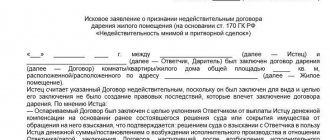In legal practice, the term “termination” is widely used in relation to gift agreements. Although in civil legislation there is no concept of “termination of a gift agreement” as such.
Using the specified terminology, they imply either the cancellation of the donation or the recognition of the contract as invalid . A transaction under which property is donated can be terminated both before it is transferred into ownership by the donee, and after such transfer, but only on legal grounds. Termination of a gift agreement can be carried out at the initiative of the donor, the donee, as well as interested parties.
How does cancellation work?
The gift agreement can be canceled and terminated (according to Articles 577 and 578 of the Civil Code of the Russian Federation).
A deed of gift for an apartment can be revoked in court if there were violations of current legislation during its conclusion. An agreement may be invalid due to illegal content, an unspecified form, the inability of the donor for various reasons to enter into such transactions, or inconsistency with the will of the donor.
A contract can only be challenged in court, and its nullity is recognized by virtue of a direct indication of this in the law.
The possibility of canceling a deed of gift protects the rights of the donor . That is, the gift agreement has retroactive force, but this requires compelling reasons. You cannot simply cancel a gift agreement at will.
Is withdrawal allowed after state registration?
A deed of gift after state registration of property rights can be canceled in court if the fact of an attempt on the life of the donor (members of his family) or harm to health is proven.
The donor may revoke the agreement after registering the rights to the apartment and if he proves that the recipient of the gift poses a threat of destruction of the property.
It is possible to revoke a contract without the participation of a court if the recipient of the gift died before the donor, and if two conditions were met:
- this nuance was stated in the clause in the agreement;
- Until the moment of death, the recipient of the gift was the owner of the apartment (that is, the gift was not transferred or sold).
Arbitrage practice
If the plaintiffs provide sufficient evidence, the courts satisfy the demands to recognize the DD as invalid and apply the consequences of the invalidity of the transaction - cancellation of the deed of gift and return of ownership.
Several solutions illustrate this:
- Decision No. 2-402/2019 2-402/2019~M-331/2019 M-331/2019 dated June 25, 2021 in case No. 2-402/2019;
- Decision No. 2-44/2019 2-500/2018 dated June 28, 2021 in case No. 2-44/2019;
- Decision No. 2-262/2019 2-262/2019~M-97/2019 M-97/2019 dated June 27, 2019 in case No. 2-262/2019.
Another common ground for applying to court to cancel a DD is the commission of a crime against the health and life of the donor. In such a situation, he himself, his representative, and, in the event of death, his heirs have the right to apply.
Deadlines for revoking deed of gift
Under voidable contracts, which include donation, in accordance with Art. 181 of the Civil Code of the Russian Federation, the limitation period for recognition of invalidity is one year (from the date of cessation of the threat or violence).
If a gift agreement is recognized as void, the limitation period is three years (Article 181 of the Civil Code of the Russian Federation).
When the statute of limitations for challenging a deed of gift begins to count depends on who files the lawsuit.
- If the donor, under the influence of violence, entered into a donation agreement, then this transaction can be declared invalid by filing a lawsuit within a year from the date the violence ceased.
- If a third party learns of a violation of its rights, then the period for filing a claim is three years from the date of discovery of the violation.
The statute of limitations may be reinstated or suspended under certain circumstances.
Conditions for invalidating a contract
The main condition is pre-trial settlement of the dispute . The parties themselves need to come to a solution to the problem.
Pre-trial dispute resolution can also include resolving the issue by accepting an agreement . The parties enter into an agreement resolving their disputed issue. In this case, state registration of the agreement is required.
If agreement is not reached pre-trial, documents are submitted to the court, and the dispute is resolved in court.
Having found out the reasons and grounds, let's talk about how to terminate the gift agreement for an apartment.
Who has the right to terminate the agreement?
, as well as third parties, can terminate the gift agreement
Donor
The donor can cancel the donation transaction if the donee has made an attempt on his life or the life of close relatives. Intentional infliction of bodily harm is also grounds for termination of the contract.
The second reason for canceling the deed of gift is the commission by the recipient of the gift of actions that create the threat of irretrievable loss of the apartment (Article 578 of the Civil Code of the Russian Federation).
Only the donor himself can cancel a donation for this reason. Heirs do not have such a right.
If the donee dies before the donor, the latter has the right to revoke the gift.
The donor has the right to refuse the gift agreement if the agreement was concluded for the future. According to Art. 577 of the Civil Code of the Russian Federation, the donor can make such a decision if life circumstances have changed significantly after the conclusion of the contract, and the execution of the contract will lead to a significant decrease in his standard of living.
Recipient
Legislatively, the right of the donee to refuse a gift is enshrined in Art. 573 Civil Code of the Russian Federation. The refusal can be formalized by a deed of gift to the former owner or by concluding an agreement to cancel the gift agreement.
The easiest way is to refuse the gift before or during the conclusion of the deed of gift.
If the recipient wanted to return the donated apartment, how to return it back to the donor after signing the agreement, when he does not agree? To resolve this conflict they go to court.
Third parties
Third parties include parties whose interests were infringed as a result of the transaction (this could be government agencies or other family members).
On the part of guardianship authorities or investigative authorities, a real estate donation transaction may be canceled for the following reasons:
- The gift agreement was not registered with the Federal Registration Service.
- A mandatory condition (the transaction is free of charge) has been violated.
- The agreement contains a clause on the transfer of ownership after the death of the donor. Read more about whether it is possible to challenge a deed of gift after the death of the donor and who has the right to do so here.
- The information provided in the contract contains errors.
- In the drawn up agreement there is no signature of one of the parties (donor or donee).
- A gift agreement infringes on the rights of a minor or incapacitated person.
Cancellation of a donation may occur on the basis of a claim by interested persons or relatives of the donor.
It is possible to submit a request to cancel a donation if:
- the recipient of the gift committed actions that led to the death of the donor;
- At the time of concluding the donation agreement, the donor was incapacitated.
Third parties can challenge the deed of gift only in court.
Is it possible to cancel a deed of gift if it was made orally?
It is more difficult to revoke a gift that was made orally than a written agreement. The complexity is due to the fact that the donor or other persons initiating the cancellation must prove:
- That the fact of donation took place.
- Availability of grounds for cancellation.
- That the property they want to get back previously belonged to the donor, but he donated it.
This will require witness testimony, audio and video recordings and other evidence of the transfer of the gift item to the donee.
It is impossible to revoke a deed of gift made orally on the grounds that the donor has outlived the donee. Since such a condition must be enshrined in the text of the gift agreement.
Revocation of the decision by the donor
Most often, the initiator of the revocation of the deed of gift is the donor. The donor can cancel his decision pre-trial or through the court.
Pre-trial
To avoid litigation, both parties to the contract should not object to the termination of the transaction. To document the decision, you will need a notary who will draw up a new document. In such situations, the recipient of the gift writes a deed of gift to the donor.
If the first gift agreement contained a clause indicating the possibility of terminating the agreement with mutual consent of the parties, then it is possible to draw up not a new gift deed, but a termination of the agreement.
In court: step-by-step instructions
If the parties do not reach an agreement, then they need to go to court. The main task of the plaintiff will be to provide evidence that the court would consider significant.
Jurisdiction
The claim must be filed in the court that has jurisdiction over the defendant. The plaintiff can choose jurisdiction independently if the defendant’s place of residence is unknown (Article 29 of the Code of Civil Procedure of the Russian Federation). A claim regarding termination of the deed of gift can be filed at the location of the apartment or at the last known place of residence of the defendant in the Russian Federation.
If the claim concerns several defendants at once, then the claim can be filed at the residential address of one of the defendants.
Documentation
To file a claim in court, you will need the following documents:
- statement;
- donor's passport;
- copy of the deed of gift;
- an extract from the register confirming the transfer of ownership to the recipient of the gift;
- evidence confirming the validity of the claim;
- bank statement confirming payment of state duty.
Filing a claim
When filing a claim, indicate:
- name of the court to which the appeal is sent;
- full information about the plaintiff and data about the defendant;
- the exact wording of the requirement (to invalidate the contract or terminate the agreement);
- cost of claim;
- evidence, circumstances and justification (what causes the claim);
- documents confirming these facts.
We do not recommend completing the documents yourself. Save time - contact our lawyers by phone:
8 (800) 302-76-94
Proof
In order for the court to invalidate the deed of gift, significant evidence must be presented. This can be witness testimony, certificates, medical reports, extracts, video recordings.
To recognize a gift transaction as void, you can provide a receipt for the transfer of money to the donor from the donee. Evidence may be the testimony of lawyers, notaries to whom the parties turned for help, or witnesses to the transaction.
If the transaction is disputed due to violence against the donor, then statements of a corresponding nature to the local police officer or the police, SMS messages, letters can serve as evidence.
Duration and cost of the procedure
After receiving the claim, the judge must make a decision within five days to consider the case or to refuse to consider the case.
The institution of first instance has the right to consider civil disputes within two months. The dissenting party can then appeal. Such proceedings may drag on for several months. Therefore, you need to ask whether the decision has been reversed.
The cost of legal support services starts from 10,000 rubles. State registration of a new agreement will cost the applicant 2,000 rubles, and issuing a certificate will cost 200 rubles.
If the plaintiff demands that the transaction be declared invalid, then a state fee of 300 rubles is paid. If you had to go to court to return the property, then according to Art. 333.24 of the Tax Code of the Russian Federation, you will need to pay a state duty in the amount of 13,200 rubles. plus 0.5% of the excess of 1 million rubles, but not more than 60,000 rubles. (if the value of the claim is more than 1 million rubles).
Where to start, where to turn?
First of all, you must obtain permission to return the transaction to normal. How you will reach a consensus is unknown, the main thing is that the parties, by a court decision or their own conviction, must decide to take this step.
Where do they apply, where to apply? Next, a reverse agreement is drawn up , in which the party who was recently the donee donates this property to the other party.
This transaction is formalized first at the notary, then at the Rosreestr. Filling it out with a notary is not a mandatory step .
Can the new owner return the living space?
You can return the gift back if the recipient changes his mind for some reason about becoming the owner of the home. There can be many reasons:
- reluctance to aggravate the situation with the relatives of the generous donor;
- the apartment is donated with an encumbrance (debts, credit, there is a right of lifelong residence of other people);
- emergency condition of housing;
- doubts regarding the donor’s legal capacity;
- conflict between the donor and the recipient;
- inability to pay taxes and maintain the apartment in the future;
- Some donors deprive relatives of their inheritance this way, and recipients refuse for moral reasons.
According to Art. 573 of the Civil Code of the Russian Federation, the donee is not obliged to provide the reason for refusing the gift.
Is damage caused by donation compensated?
The donor's obligation to compensate for damage to the recipient of the gift arises when it was caused as a result of defects in the donated item, if it is proven that these defects - Art. 580 Civil Code of the Russian Federation:
- Arose before the transfer of the gift to the donee.
- Are not explicit.
- They were known to the donor, but he did not warn the recipient of the gift about them.
For the owner of the gift to become liable, all the above conditions must be present simultaneously.
Damage caused is subject to compensation according to the rules established by Chapter 59 of the Civil Code of the Russian Federation and in one of the following ways - Art. 1082 Civil Code of the Russian Federation:
- Compensation for damage in kind involves transferring to the donee an item of the same kind and quality or repairing a damaged item.
- Compensation for damages caused - if it is impossible to compensate for the damage in kind, then it is assumed that a certain amount of money will be paid to the donee. For example, when it was caused to the health of the recipient of the gift.
Grounds and conditions for cancellation of the agreement
The legislation clearly states the reasons why the donor of an apartment can abandon his intentions. Regarding the donee who wants to return the gift, the legislation does not impose such requirements.
If before the moment of refusal of the gift the gift agreement was not registered, then it will not be difficult to refuse the gift.
The gift agreement is considered executed after registration of the donee's ownership of the real estate. According to Art. 578 of the Civil Code of the Russian Federation, in case of cancellation of the donation, the gift must be returned in the condition that was at the time of donation.
Consequences of termination of the contract
The consequence of termination of the gift agreement is always the return of the donated property back to the donor . In case of cancellation of the donation, in accordance with paragraph 5 of Article 578 of the Civil Code, the donee is obliged to return the gift in kind if it was preserved at the time of cancellation of the contract.
This rule is practically similar to the general rules outlined in paragraph 1 of Article 1104 of the Civil Code. But there are cases when the recipient, in order not to return the donated property, sells it to third parties, deliberately destroys it or causes irreparable harm to it. Then the legal consequences and other rules on unjust enrichment are applied , provided for in paragraph 1 of Article 1105 of Chapter 60 of the Civil Code, as well as requirements for compensation for damage caused (Chapter 59 of the Civil Code).
Attention
If the return of the donated property in kind is impossible, then the donee must return to the donor the actual value of this property at the time of its acquisition, as well as losses caused due to changes in the value of the gift that could arise due to late payment.
If a gift agreement is declared invalid, general provisions on the consequences of invalidity of transactions apply (Article 167 of the Civil Code). Paragraph 2 of this article obliges the donee to return to the donor in kind all the property received as a gift under the transaction, and if this is impossible to do, to reimburse its value.
Cancellation periods before and after registration
The donee has the legal right to refuse the gift before the transaction is completed. Regarding real estate, this is the period until the deed of gift is registered in Rosreestr. Before registering property rights, it is enough to go to the notary who certified the donation agreement and declare the need to draw up a new document. In this case, the donor’s consent is not required for refusal.
If the donee refuses the gift after registration of ownership in Rosreestr, then it is necessary to obtain the consent of the donor (preferably in writing) to cancel the transaction. When a compromise is reached, the parties enter into a new agreement, which is registered in Rosreestr.
Contract form
The form of the gift agreement depends on several components:
- firstly, from the subject of the donation;
- secondly, from the subject composition of its parties;
- thirdly, on the value of the gift.
A deed of gift can be made either orally or in writing.
By oral agreement, things and property can be donated that do not require state registration of the transfer of ownership. Such a gift is made through a symbolic transfer , for example, of car keys, the presentation of a gift or documents of title. Thus, the donation of movable property, which is transferred at the time of concluding a real contract, can be made orally.
The exception is when the donor of such property is a legal entity and the value of the gift exceeds 3,000 rubles (clause 2 of Article 574 of the Civil Code). Although some civil experts exclude this possibility due to the procedure for changing data in the technical passport about the owner of the vehicle.
They generally consider gift agreements concluded orally problematic, since difficulties often arise with them during legal proceedings, when the question of their termination or invalidation arises. Among other things, the plaintiff has to additionally prove that the disputed agreement is a donation and not another transaction.
Important
Paragraph 3 of Article 574 and Article 131 of the Civil Code provide for real and consensual agreements, the subject of which is real estate, a written form of the transaction and mandatory state registration of ownership rights to real estate. Agreements containing a promise of donation in the future are also drawn up in writing (clause 2 of Article 574 of the Civil Code).
If, under a gift agreement, a claim or transfer of debt is transferred from the donee to the donor, then it must be made in the form established by paragraph 1 of Article 389 of the Civil Code for the assignment of a claim and paragraph 2 of Article 391 of the Civil Code for the transfer of debt. A real gift transaction for debt forgiveness, which frees the donee from obligations to the donor, is concluded in free form .
Step-by-step return instructions
- If the return of real estate occurs before the registration of the deed of gift in Rosreestr, then the donee only needs to issue a written refusal. The application contains the donor's details and information about the apartment. Then the refusal is certified by a notary.
- If the deed of gift for the apartment has already been registered, then the recipient must also write a refusal of the gift, then the donor and donee confirm the termination of the gift with a notary. Then the parties contact Rosreestr.
In cases where one of the parties to the gift agreement does not agree with the termination of the agreement, the issue is resolved through the court.
Where to start and where to go?
The recipient of the gift must contact the donor with a written request to terminate the deed of gift. If the donor’s consent is obtained, then the notary certifies the agreement to terminate the previous contract.
Documentation
To return the apartment, the recipient of the gift must:
- original agreement;
- passports of the donor and recipient;
- certificate from the Unified State Register of Real Estate;
- certificate of number registered;
- consent of the remaining members of the recipient of the gift to cancel the deed of gift;
- bank document confirming payment of state duty;
- deed of appraised value.
Timing and cost
According to Art. 333.24 of the Tax Code of the Russian Federation, the fee for notary services for certifying agreements that require a notarial form in accordance with the law is 200 rubles.
If one of the parties to the donation agreement files a lawsuit, then you will have to pay a state fee in the amount of 13,200 rubles. plus 0.5% of the excess of 1 million rubles, but not more than 60,000 rubles. (if the value of the claim is more than 1 million rubles).
the reverse transfer of ownership of an apartment within a week. But this is the simplest and fastest option if there is agreement between the parties. Litigation lasts much longer; the court has the right to consider the case within two months. Therefore, it is worth asking whether the gift agreement was canceled and whether the property was returned.
In legal practice, there are situations in which relatives challenge or cancel apartment donation transactions. We advise you to read the articles of our experts about what are the grounds and in what cases can you challenge a deed of gift during the life of the donor and after his death.
The concept of a gift agreement
A gift agreement, like any transaction, represents a relationship between two or more parties, but unlike many transactions it is always gratuitous .
A gift involves a gratuitous transfer or obligation to transfer in the future property from one party (the donor) to another party (the donee).
Property means things, including movable and immovable property, property rights, money and securities, and more. A more precise definition of a gift agreement is provided by paragraph 1 of Article 572 of the Civil Code.
The peculiarities of such an agreement are two factors: the moment of its conclusion and the transfer of ownership of the object of donation. If they coincide in time, then we are dealing with a real transaction; if they do not coincide, then we are dealing with a consensual or contract of promise of gift.
Attention
The main common feature of such agreements is their gratuitous nature.
Gratuitousness does not affect the motives for making a donation, which in each specific case may be different and depend on specific circumstances. The only condition is that they should not affect the validity of the contract itself. This means that it must not contain any counter-provisions or obligations, otherwise, in accordance with paragraph 2 of paragraph 1 of Article 572 of the Civil Code, such a gift agreement will be void .
Example
Citizen Dmitriev O.G. The desire to give a gift to citizen A.V. Miroshnik, the son of his cousin, arose from the time when he helped him in an unforeseen situation and thereby saved him from big troubles. And when citizen Miroshnik A.V. turned to him with a request to sell him a dacha plot of land, he decided that such a moment had come. Citizen Dmitriev O.G. transfers to citizen A.V. Miroshnik six acres of land at a price that is several times lower than its real market value. Thus, on the one hand, he seems to be making a very generous gift to his savior, but on the other hand, such a transaction is not a gift, but a purchase and sale, since the agreement contains a counter obligation to pay for the dacha plot of land.
From this example it follows that the basis of the gift agreement is not the desire to give a gift to someone, but the intention to do it for free . Thus, we come to another sign of a gift agreement - the donor’s intention to make a donation, that is, to increase the donee’s property (enrich him) by reducing his own.
Additionally
In turn, a decrease in the donor’s property and an increase in the donee’s property are two more separate signs of a gift agreement.
For such a transaction, it is important that the intention arises from the free will of the donor , without coercion on the part of the donee or third parties, otherwise, in accordance with Article 179 of the Civil Code, it will entail invalidity. However, the best intentions of the donor must necessarily correspond to the desire of the recipient to accept the gift . Therefore, an important feature of a gift agreement, which affects its validity, is the consent of the donee to receive the gift.
Is it possible that the property cannot be returned?
The most common reason for refusing to cancel a deed of gift is a change in the owner of the apartment. If the donee has already exercised his right to dispose of the apartment (donated it, sold it, etc.), it will be very difficult to return the property to the donor.
The agreement to terminate the deed of gift should not have two-valued interpretations or conventions. Otherwise, Rosreestr has the right to refuse registration of documents.
The court has the right to refuse the donor or donee in the absence of grounds (strong evidence) to cancel the agreement. If the court of first instance refuses the plaintiff, then if there is strong evidence, it is worth seeking the truth in the higher courts by filing an appeal.
The law reserves for the donor the right to cancel the deed of gift in order to protect his interests in the event of malicious ingratitude of the recipient of the gift. But the desire to “annoy” the donee alone will not be enough to cancel the contract.
If there is mutual agreement to terminate the contract, there will be no problems with canceling the deed of gift. But judicial practice shows that cases of reaching a compromise in real estate matters are very rare.
The legislative framework
What laws govern this? This very concept is contained in the Civil Code, which is quite natural for this legislative act, since it is he who is responsible for the description and regulation of transactions carried out on the territory of our country.
about donation and the nuances of the transaction in Chapter 32, namely, in Article 572.
But we are not interested in the system of carrying out the procedure, but in the situations in which it will be terminated . This issue is also regulated by the Civil Code, Article 578. Learn about the nuances of donating a share of an apartment to a minor child, in particular how to draw up an agreement for donating a share of an apartment to children, from our articles.
Voluntary order
The voluntary procedure for terminating a gift agreement involves concluding a notarized agreement. If the subject of the donation was real estate subject to state registration, then after the appropriate execution of the agreement on termination of the gift agreement, having collected all the necessary documents, including a receipt for payment of the state duty, you need to register the reverse transfer of property at the registration service.
If the donee refuses to accept the gift or the donor refuses to fulfill the obligation under the consensual gift agreement, it will be considered terminated after a written statement from one or the other party about its decision. The legislation also provides for the cancellation of a gift based on a notarized application from the donor to the recipient.
This is possible in two cases:
- When the donee showed malicious ingratitude towards the donor, expressed in an attempt on him personally or one of his family members and close relatives, or deliberately inflicting bodily harm on him (paragraph 1 of paragraph 1 of Article 578 of the Civil Code). The fact of an unlawful action on the part of the donee must be confirmed either by a court verdict in a criminal case, or by a court decision in civil proceedings.
- When the donor survives the donee, provided that this was stipulated in the content of the gift agreement (clause 4 of Article 578 of the Civil Code).
Termination of a void gift agreement by law does not require judicial recognition of its invalidity. However, as practice shows, no one voluntarily returns anything to anyone, so the termination of gift transactions, as a rule, occurs in court.
Agreement on termination of a gift agreement - sample:
How to invalidate a transaction
Check for errors. The deed of gift will have legal force even if it is drawn up in writing without the participation of a notary. In such cases, errors are often made when drawing up a document (in the text of the contract or during registration).
Mostly mistakes are made when drawing up the terms of the contract. Sometimes the contract specifies conditions related to a material nature. Such a document can be challenged without any problems, since the gift agreement does not imply any monetary payments.
Also, a deed of gift is invalid if it contains a condition indicating that the apartment will be donated only after the death of the donor.
Gift without the consent of the spouse. This option includes a place of residence that was directly acquired jointly, i.e., in marriage. In this case, if one of the spouses did not consent to the execution of a deed of gift for the apartment, the transaction is considered invalid.
An example of a spouse's consent to donate an apartment.
Confirm the inadequacy and incapacity of the donor . It is considered the most popular method of challenging this type of transaction. Most often, the following are confirmed as incompetent: elderly people, disabled people, alcoholics, drug addicts. Less commonly, temporary incapacity can be attributed to people who have been subjected to hypnosis and psychological influence. The only way to prove the donor’s incompetence is to confirm it with a doctor’s report and collect as much evidence and witnesses as possible.
If the guardian, on his own behalf, donated property to a minor or incapacitated ward. Such transactions are against the law and are deprived of legal force.
Donating an apartment as a thank you to an employee for his professional activities. This type of transaction is considered not only invalid, but also illegal. Medical workers, social workers, civil servants, municipal workers and other persons on whom the donor depends do not have the right to accept gifts of not only apartments, but also other material assets.
Donation of a commercial direction (in favor of a legal organization). The ban was put in place solely to prevent fraud. But there is an exception - a deed of gift covering a debt is considered an acceptable procedure. The main condition is that the donor does not receive any material benefit from his gift.
Prove that the owner is forced to donate the apartment . This process is also considered popular, but at its core it is one of the complex court cases. Proving coercion is very difficult, especially if there are no witnesses.
Take, for example, a seemingly loving and caring grandson who suddenly attacked his grandmother with threats and forced her to write a deed of gift for a second apartment. After a while, the grandmother pulled herself together and filed a lawsuit to declare the transaction invalid due to coercion.
The grandson stated that the grandmother, out of spite, decided to take the donated apartment back. The old woman was a complex person by nature, and when questioned, the neighbors sided with her grandson, saying that the woman had always been greedy and capricious. As a result, the court sided with the grandson, and the poor grandmother lost her second apartment. Conclusion: the grandmother, unknowingly, did not collect significant evidence (although she could have) and lost the trial.
If the donor was misled. The donee can trick the donor into signing a gift deed. For example, under the pretext of signing another document. Most often, people who are gullible or have vision problems are susceptible to deception. In this case, a loved one can easily provide the donor with a deed of gift in the form of consent to treatment in a boarding house. The donor will sign all the documents without even thinking that this is a fraud.
It is possible to terminate such a transaction in court if the documents were not certified by a notary. Otherwise, the transaction remains in force, since the notary must explain the essence of the agreement to both parties and read the rights and obligations of each party.
Fraud. Under such circumstances, the court will have to prove that the transaction, formalized in the form of a gift agreement, was in fact a cover for a transaction of a different type. In this case, the interested party will have to prove that the donor received material benefits from the transaction. If you do not provide significant evidence, it will be impossible to invalidate the transaction.









